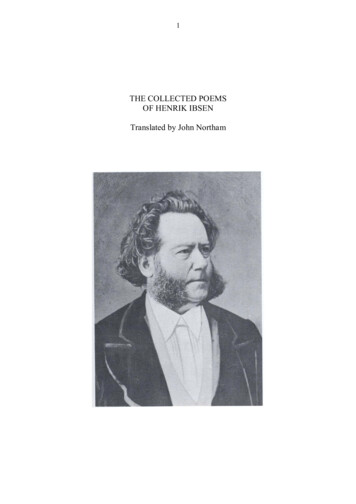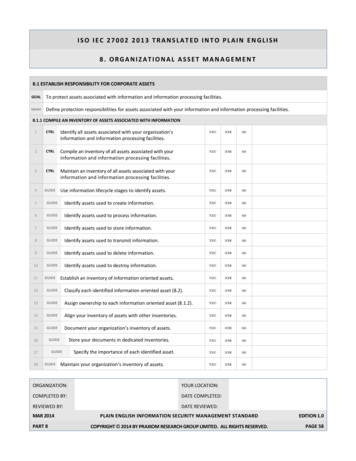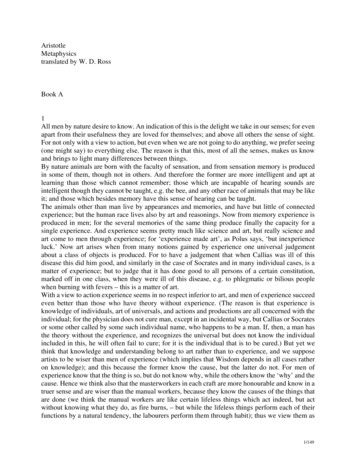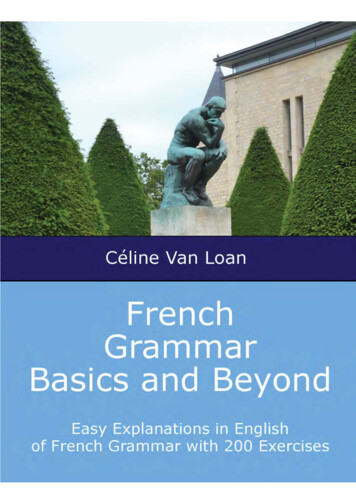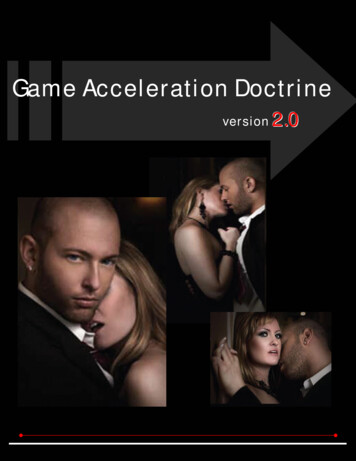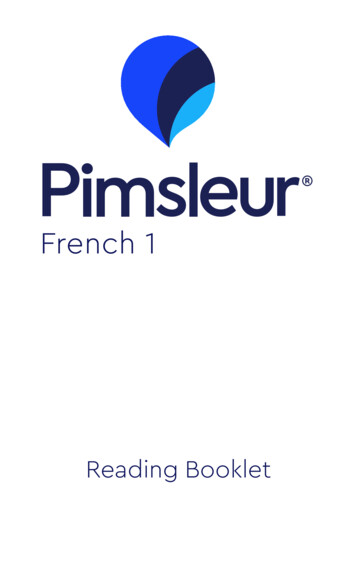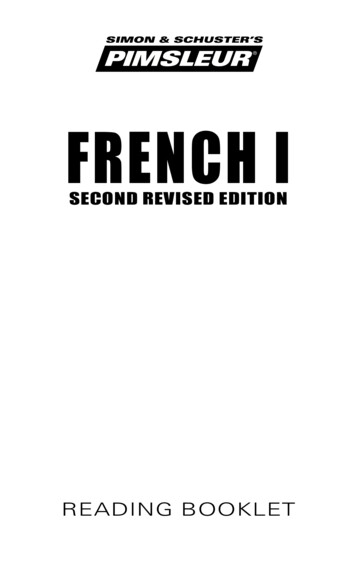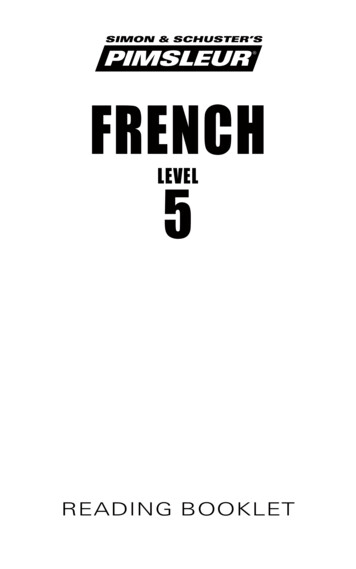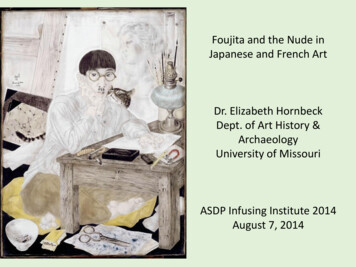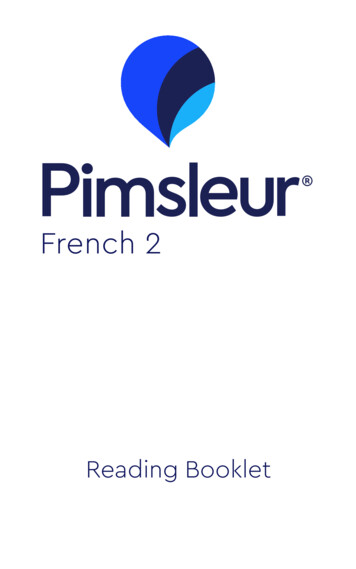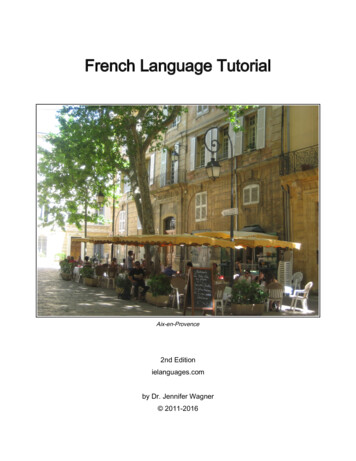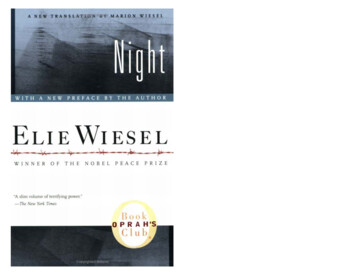
Transcription
Also by Elie WieselDAWNTHE OSLO ADDRESSDAY (previously THE ACCIDENT)TWILIGHTTHE TOWN BEYOND THE WALLTHE SIX DAYS OF DESTRUCTIONTHE GATES OF THE FORESTTHE JEWS OF SILENCELEGENDS OF OUR TIME(with Albert Friedlander)A JOURNEY INTO FAITH(conversations with JohnCardinal O'Connor)A BEGGAR IN JERUSALEMA SONG FOR HOPE (cantata)ONE GENERATION AFTERFROM THE KINGDOM OF MEMORYSOULS ON FIRESAGES AND DREAMERSTHE OATHTHE FORGOTTENANI MAAMIN (cantata)A PASSOVER HAGGADAH (illustratedZALMEN, OR THE MADNESS OF GOD(play)MESSENGERS OF GODA JEW TODAYFOUR HASIDIC MASTERSTHE TRIAL OF GOD (play)by Mark Podwal)ALL RIVERS RUN TO THE SEAMEMOIR IN TWO VOICES (withFrançois Mitterand)KING SOLOMON AND HIS MAGICRING (illustrated by MarkPodwal)THE TESTAMENTAND THE SEA IS NEVER FULLFIVE BIBLICAL PORTRAITSTHE JUDGESSOMEWHERE A MASTERCONVERSATIONS WITH ELIETHE GOLEM (illustrated by MarkPodwal)WIESEL (with Richard D.Heffner)THE FIFTH SONWISE MEN AND THEIR TALESAGAINST SILENCE (edited by IrvingTHE TIME OF THE UPROOTEDAbrahamson)Night
ELIEWIESELT R A N S L A T E D FROM THE F R E N C H BY MARION W I E S E LH I L L A N D WANGA DIVISION OF FARRAR, STRAUS AND GIROUXNEW YORK
In memory ofmy parents and of my little sister, TziporaE.W.Hill and WangA division of Farrar, Straus and Giroux19 Union Square West, New York 10003Copyright 1958 by Les Editions de MinuitTranslation copyright 2006 by Marion WieselPreface to the New Translation copyright 2006 by Elie WieselNobel Peace Prize Acceptance Speech copyright 1986 by the Nobel FoundationAll rights reservedDistributed in Canada by Douglas & McIntyre Ltd.Printed in the United States of AmericaPublished simultaneously in hardcover and paperback by Hill and WangFirst edition of this translation, 2006Library of Congress Control Number: 2005936797Hardcover ISBN-13: 978-0-374-39997-9Hardcover ISBN-10:0-374-39997-2Paperback ISBN-13:9 78-0-3 74-50001-6Paperback ISBN-10:0-374-50001-0Designed by Abby Kaganwww.fsgbooks.com1719201816This new translationin memory ofmy grandparents, Abba, Sarah and Nachman,who also vanished into that nightM.W.
Preface to the New Translationby Elie WieselIonly one book, this wouldbe the one. Just as the past lingers in the present, all my writings after Night, including those that deal with biblical, Talmudic, or Hasidic themes, profoundly bear its stamp, and cannotbe understood if one has not read this very first of my works.Why did I write it?F IN MY L I F E T I M E I WAS TO WRITEDid I write it so as not to go mad or, on the contrary, to go madin order to understand the nature of madness, the immense, terrifying madness that had erupted in history and in the conscienceof mankind?Was it to leave behind a legacy of words, of memories, to helpprevent history from repeating itself?Or was it simply to preserve a record of the ordeal I endured asan adolescent, at an age when one's knowledge of death and evilshould be limited to what one discovers in literature?There are those who tell me that I survived in order to writethis text. I am not convinced. I don't know how I survived; I wasweak, rather shy; I did nothing to save myself. A miracle? Certainly not. If heaven could or would perform a miracle for me,
why not for others more deserving than myself? It was nothingmore than chance. However, having survived, I needed to givesome meaning to my survival. Was it to protect that meaning thatI set to paper an experience in which nothing made any sense?In retrospect I must confess that I do not know, or no longerknow, what I wanted to achieve with my words. I only know thatwithout this testimony, my life as a writer—or my life, period—would not have become what it is: that of a witness who believeshe has a moral obligation to try to prevent the enemy from enjoying one last victory by allowing his crimes to be erased fromhuman memory.For today, thanks to recently discovered documents, the evidence shows that in the early days of their accession to power, theNazis in Germany set out to build a society in which there simplywould be no room for Jews. Toward the end of their reign, theirgoal changed: they decided to leave behind a world in ruins inwhich Jews would seem never to have existed. That is why everywhere in Russia, in the Ukraine, and in Lithuania, the Einsatzgruppen carried out the Final Solution by turning their machineguns on more than a million Jews, men, women, and children, andthrowing them into huge mass graves, dug just moments beforeby the victims themselves. Special units would then disinter thecorpses and burn them. Thus, for the first time in history, Jewswere not only killed twice but denied burial in a cemetery.It is obvious that the war which Hitler and his accompliceswaged was a war not only against Jewish men, women, and children, but also against Jewish religion, Jewish culture, Jewish tradition, therefore Jewish memory.in history would be judgedone day, I knew that I must bear witness. I also knew that, whileCONVINCED THAT THISPERIODI had many things to say, I did not have the words to say them.Painfully aware of my limitations, I watched helplessly as language became an obstacle. It became clear that it would be necessary to invent a new language. But how was one to rehabilitateand transform words betrayed and perverted by the on—fire—chimney:these words all have intrinsic meaning, but in those times, theymeant something else. Writing in my mother tongue—at thatpoint close to extinction—I would pause at every sentence, andstart over and over again. I would conjure up other verbs, otherimages, other silent cries. It still was not right. But what exactlywas "it"? "It" was something elusive, darkly shrouded for fear ofbeing usurped, profaned. All the dictionary had to offer seemedmeager, pale, lifeless. Was there a way to describe the last journey in sealed cattle cars, the last voyage toward the unknown? Orthe discovery of a demented and glacial universe where to be inhuman was human, where disciplined, educated men in uniformcame to kill, and innocent children and weary old men came todie? Or the countless separations on a single fiery night, the tearing apart of entire families, entire communities? Or, incredibly,the vanishing of a beautiful, well-behaved little Jewish girl withgolden hair and a sad smile, murdered with her mother the verynight of their arrival? How was one to speak of them withouttrembling and a heart broken for all eternity?Deep down, the witness knew then, as he does now, thathis testimony would not be received. After all, it deals with anevent that sprang from the darkest zone of man. Only thosewho experienced Auschwitz know what it was. Others will neverknow.But would they at least understand?Could men and women who consider it normal to assist theweak, to heal the sick, to protect small children, and to respect
the wisdom of their elders understand what happened there?sion that every one of us has been entrusted with a sacred sparkWould they be able to comprehend how, within that cursed uni-from the Shekhinah's flame; that every one of us carries in hisverse, the masters tortured the weak and massacred the children,eyes and in his soul a reflection of God's image.the sick, and the old?That was the source if not the cause of all our ordeals.And yet, having lived through this experience, one could notkeep silent no matter how difficult, if not impossible, it was toOther passages from the original Yiddish text had more on thedeath of my father and on the Liberation. Why not include thosespeak.And so I persevered. And trusted the silence that envelopsand transcends words. Knowing all the while that any one of thein this new translation? Too personal, too private, perhaps; theyneed to remain between the lines. And y e t fields of ashes in Birkenau carries more weight than all the testimonies about Birkenau. For, despite all my attempts to articulatethe unspeakable, "it" is still not right.Is that why my manuscript—written in Yiddish as "And theI remember that night, the most horrendous of my life: Eliezer, my son, come h e r e I want to tell yous o m e t h i n g Only to y o u C o m e , don't leave me alone Eliezer "World Remained Silent" and translated first into French, theninto English—was rejected by every major publisher, French andAmerican, despite the tireless efforts of the great Catholic FrenchI heard his voice, grasped the meaning of his words and thetragic dimension of the moment, yet I did not move.writer and Nobel laureate François Mauriac? After months andIt had been his last wish to have me next to him in his agony,months of personal visits, letters, and telephone calls, he finallyat the moment when his soul was tearing itself from his laceratedsucceeded in getting it into print.body—yet I did not let him have his wish.Though I made numerous cuts, the original Yiddish versionI was afraid.still was long. Jérôme Lindon, the legendary head of the small butAfraid of the blows.prestigious Éditions de Minuit, edited and further cut the FrenchThat was why I remained deaf to his cries.version. I accepted his decision because I worried that someInstead of sacrificing my miserable life and rushing to histhings might be superfluous. Substance alone mattered. I wasside, taking his hand, reassuring him, showing him that he wasmore afraid of having said too much than too little.Example: in the Yiddish version, the narrative opens withthese cynical musings:not abandoned, that I was near him, that I felt his sorrow, insteadof all that, I remained flat on my back, asking God to make myfather stop calling my name, to make him stop crying. So afraidwas I to incur the wrath of the SS.In the beginning there was faith—which is childish; trust—whichIn fact, my father was no longer conscious.is vain; and illusion—which is dangerous.Yet his plaintive, harrowing voice went on piercing the si-We believed in God, trusted in man, and lived with the illu-lence and calling me, nobody but me.
"Well?" The SS had flown into a rage and was striking myfather on the head: "Be quiet, old man! Be quiet!"My father no longer felt the club's blows; I did. And yet I didnot react. I let the SS beat my father, I left him alone in thechange the course of history or shake the conscience of theworld.Books no longer have the power they once did.Those who kept silent yesterday will remain silent tomorrow.clutches of death. Worse: I was angry with him for having beennoisy, for having cried, for provoking the wrath of the SS."Eliezer! Eliezer! Come, don't leave me a l o n e "His voice had reached me from so far away, from so close. ButI had not moved.I shall never forgive myself.Nor shall I ever forgive the world for having pushed meagainst the wall, for having turned me into a stranger, for havingawakened in me the basest, most primitive instincts.His last word had been my name. A summons. And I had notresponded.In the Yiddish version, the narrative does not end with the image in the mirror, but with a gloomy meditation on the present:And now, scarcely ten years after Buchenwald, I realize that theworld forgets quickly. Today, Germany is a sovereign state. TheGerman Army has been resuscitated. Use Koch, the notorioussadistic monster of Buchenwald, was allowed to have childrenand live happily ever a f t e r W a r criminals stroll through thestreets of Hamburg and Munich. The past seems to have beenerased, relegated to oblivion.Today, there are anti-Semites in Germany, France, and eventhe United States who tell the world that the "story" of six million assassinated Jews is nothing but a hoax, and many people,not knowing any better, may well believe them, if not today thentomorrow or the day a f t e r I am not so naive as to believe that this slim volume willwould be entitled to ask: Why this new translation,since the earlier one has been around for forty-five years? If it isnot faithful or not good enough, why did I wait so long to replaceit with one better and closer to the original?T H E READERIn response, I would say only that back then, I was an unknown writer who was just getting started. My English was farfrom good. When my British publisher told me that he had founda translator, I was pleased. I later read the translation and itseemed all right. I never reread it. Since then, many of my otherworks have been translated by Marion, my wife, who knows myvoice and how to transmit it better than anyone else. I am fortunate: when Farrar, Straus and Giroux asked her to prepare a newtranslation, she accepted. I am convinced that the readers will appreciate her work. In fact, as a result of her rigorous editing, I wasable to correct and revise a number of important details.And so, as I reread this text written so long ago, I am glad thatI did not wait any longer. And yet, I still wonder: Have I used theright words? I speak of my first night over there. The discovery ofthe reality inside the barbed wire. The warnings of a "veteran"inmate, counseling my father and myself to lie about our ages: myfather was to make himself younger, and I older. The selection.The march toward the chimneys looming in the distance underan indifferent sky. The infants thrown into fiery d i t c h e s I didnot say that they were alive, but that was what I thought. But thenI convinced myself: no, they were dead, otherwise I surely wouldhave lost my mind. And yet fellow inmates also saw them; they
were alive when they were thrown into the flames. Historians,among them Telford Taylor, confirmed it. And yet somehow I didnot lose my mind.BEFORE CONCLUDING this introduction, I believe it important toemphasize how strongly I feel that books, just like people, have adestiny. Some invite sorrow, others joy, some both.Earlier, I described the difficulties encountered by Night before its publication in French, forty-seven years ago. Despiteoverwhelmingly favorable reviews, the book sold poorly. The subject was considered morbid and interested no one. If
ings after Night, including those that deal with biblical, Tal-mudic, or Hasidic themes, profoundly bear its stamp, and cannot be understood if one has not read this very first of my works. Why did I write it? Did I write it so as not to go mad or, on the contrary, to go mad in order to understand the nature of madness, the immense, terri- fying madness that had erupted in history and in the .
